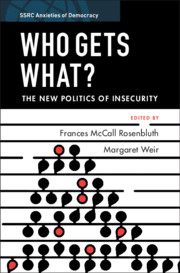1 - Introduction
The New Politics of Insecurity
Published online by Cambridge University Press: 20 August 2021
Summary
Income inequality in the United States, after declining in the postwar years, has climbed steadily in recent decades (Figure 1.1). The pain caused by the 2020 pandemic only intensified fissures already deeply etched into American life. Communities of color suffered the most devastating health consequences and bore the brunt of the economic pain. Women found themselves pushed out of the labor force as they sought to combine work and family amid shuttered schools and minimal child care. Communities across America, long blighted by a loss of manufacturing jobs and the attending “deaths of despair” from suicides and opioid overdoses (Case and Deaton 2020), watched death tolls rise. In prosperous cities, the poor and the newly unemployed were little better off, confronted with eviction notices and bleak job prospects. Yet, even as lower income Americans found their lives upended, the wealth of America’s billionaire class soared.
Information
- Type
- Chapter
- Information
- Who Gets What?The New Politics of Insecurity, pp. 1 - 22Publisher: Cambridge University PressPrint publication year: 2021
